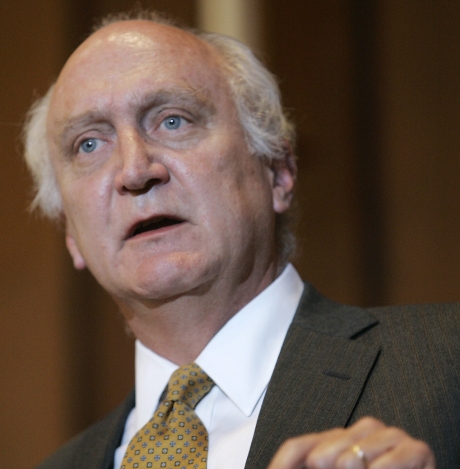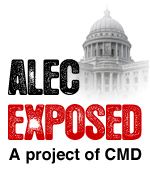Submitted by Brendan Fischer on
This month, a former leader of the Internal Revenue Service filed a complaint that the American Legislative Exchange Council (ALEC) has violated the terms of its nonprofit status by operating primarily for the private benefit of its corporate members, based on documents and research from the Center for Media and Democracy (CMD), which manages PRWatch, ALECexposed, and SourceWatch. The complaint, which also alleges that ALEC misrepresented itself in tax filings, raises additional allegations beyond those in earlier IRS complaints filed by Common Cause.
"Astounding" Violations of IRS Law
 ALEC "elevates commercial gain for a few over the well-being of society's less fortunate" through "an agenda largely crafted by the organization's corporate members," the complaint states (a pdf of the complaint is below). Marcus Owens, the former chief of the Service's nonprofit division, filed the complaint on behalf of Clergy VOICE, a group of Christian ministers in Ohio. "ALEC has deliberately and repeatedly failed to comply with some of the most fundamental federal tax requirements applicable to public charities," the complaint says. Owens is a nationally recognized expert and leader on nonprofit tax law and a member of the noted law firm Caplin & Drysdale.
ALEC "elevates commercial gain for a few over the well-being of society's less fortunate" through "an agenda largely crafted by the organization's corporate members," the complaint states (a pdf of the complaint is below). Marcus Owens, the former chief of the Service's nonprofit division, filed the complaint on behalf of Clergy VOICE, a group of Christian ministers in Ohio. "ALEC has deliberately and repeatedly failed to comply with some of the most fundamental federal tax requirements applicable to public charities," the complaint says. Owens is a nationally recognized expert and leader on nonprofit tax law and a member of the noted law firm Caplin & Drysdale.
ALEC is afforded a variety of benefits by virtue of its "charity" status -- not least of which is giving corporations a tax deduction for paying ALEC membership dues -- but in exchange for those benefits, ALEC is supposed to primarily serve public or charitable interests (rather than private interests) and engage in minimal lobbying.
"ALEC is doing an extraordinary amount of lobbying, but reporting to the IRS they are doing NO lobbying," Owens told CMD. "Even when North Dakota forced two of ALEC's attorneys to register as lobbyists, they still reported [on their IRS filings] they did no lobbying. That is astounding."
"I have never seen such a systematic and extensive operation ... to sidestep disclosure and ethics rules in a way that really allows them to have an extraordinary impact," Owens said.
Corporate Control over Model Bills Give Private Benefit
In the complaint, Owens and Clergy VOICE allege that ALEC operates primarily for the benefit of its corporate members by offering "not only unprecedented access to state lawmakers -- the very individuals who introduce and support the state laws that positively impact the corporations' bottom lines -- but also the opportunity to draft those laws." The complaint references "model" bills like the asbestos liability act, which specifically shields ALEC member Crown Holdings from asbestos liability claims, and the Drug Liability Act, which benefits ALEC member pharmaceutical companies like Pfizer or Merck by protecting them from lawsuit when their products injure or kill (as CMD discussed when that model bill was introduced in Wisconsin).
ALEC is structured to give private benefit to its corporate members, the complaint states, with its operating procedures giving ALEC's "corporate donors authority to approve or veto every legislative and policy proposal developed by ALEC's Task Forces," and its bylaws giving "corporate members disproportionate authority to appoint and remove legislators from the Task Forces."
According to the complaint, "[t]his effectively ensures that the only model laws distributed to ALEC's Legislative Members and disseminated nationwide are those that have been co-drafted and subsequently blessed by ALEC's corporate donors."
"Further, the legislative proposals that clear this process appear to be motivated substantially, if not primarily, by the pecuniary interests of ALEC's corporate members."
The complaint also notes that ALEC's legislative board and most legislative members are Republicans -- and that most of ALEC's operations provide a private benefit to the Republican Party.
Scholarships Are "the Definition of a Bribe"
 Clergy VOICE also alleges that ALEC operates to benefit its legislative members through the "scholarship program" that allows corporations to pay for the flights, hotel rooms, meals, and entertainment of ALEC politicians. The meetings are "held in luxury hotels, frequently in vacation-worthy destinations like San Diego, New Orleans and Scottsdale," and scholarships fund "perks such as meals, recreational activities, and subsidized childcare for legislators and their families." (CMD has previously described the scholarship scheme here.)
Clergy VOICE also alleges that ALEC operates to benefit its legislative members through the "scholarship program" that allows corporations to pay for the flights, hotel rooms, meals, and entertainment of ALEC politicians. The meetings are "held in luxury hotels, frequently in vacation-worthy destinations like San Diego, New Orleans and Scottsdale," and scholarships fund "perks such as meals, recreational activities, and subsidized childcare for legislators and their families." (CMD has previously described the scholarship scheme here.)
Additionally, "[m]eeting agendas include events like golf tournaments, open bar parties and baseball games -- all subsidized directly or indirectly by ALEC's corporate members," the complaint says.
Despite this, ALEC has told the IRS that it provides no scholarships and funds no travel or entertainment expenses for elected officials.
"They have to hide the fact they are making payments to state legislators," Owens told CMD. If the scheme was made public, "it would taint their efforts at the state level. People would know Exxon Mobil or someone else is funneling money to legislators," he said, as "inducement to act in a certain way."
"That's the definition of a bribe," Owens said.
Using documents made available by CMD and DBA Press' Beau Hodai (who now writes for PRWatch), the complaint examined the ALEC scholarship program in Ohio, where Clergy VOICE is based. It found legislators not only receiving thousands of dollars of payments for their own travel and entertainment, but also for their family. Although some legislators disclosed their personal receipt of "scholarships" on state disclosure forms, none reported the benefits to their families, which may also violate Ohio's ethics laws.
Hodai and CMD have raised concerns with Ohio's legislative ethics commission, but it is filled with ALEC members; Hodai was told they would not act and the only avenue remaining is a criminal referral to a state prosecutor. CMD has also joined with Common Cause in requesting that the Attorney General of Ohio investigate ALEC's undisclosed lobbying in the state.
Like CMD, Complaint Raises Contradictions in ALEC's IRS Filings
CMD also contends that the so-called scholarship program violates Wisconsin ethics and lobbying laws. In March, CMD filed a complaint with Wisconsin's Government Accountability Board (GAB) alleging the "scholarship" program violates Wisconsin laws prohibiting legislators from accepting anything of value from lobbyists (or corporations that employ lobbyists in the state), and from accepting any gifts that could reasonably be expected to influence their votes on legislation.
In response to CMD's complaint, ALEC released a letter showing that it had asked the GAB in 2010 to sanction the corporate-funded gifts. But CMD noticed that ALEC had described its "scholarship" program to the GAB in a manner contradicted by ALEC's own bylaws and its federal tax filings.
 ALEC gave Wisconsin's GAB the impression that the "scholarships" are raised and controlled by ALEC itself, telling the board that "fundraising efforts for the scholarship fund are overseen by ALEC staff members with the involvement of its private sector members ... Wisconsin state legislators, however, are not involved in these fundraising efforts" (emphasis in original). ALEC also told the GAB that "[d]ecisions on how scholarships are awarded and in what amounts are made by ALEC staff."
ALEC gave Wisconsin's GAB the impression that the "scholarships" are raised and controlled by ALEC itself, telling the board that "fundraising efforts for the scholarship fund are overseen by ALEC staff members with the involvement of its private sector members ... Wisconsin state legislators, however, are not involved in these fundraising efforts" (emphasis in original). ALEC also told the GAB that "[d]ecisions on how scholarships are awarded and in what amounts are made by ALEC staff."
But in its 2010 filing with the IRS, ALEC claimed no control over the scholarships, declaring "the State Chair [a legislator] retains the exclusive right to determine the expenditures" from the scholarship fund, and therefore the scholarship dollars "are not considered revenue and expenses of ALEC" that need to be reported to the IRS.
Owens found similar contradictions. "On the federal level, ALEC calls it corporate money," Owens told CMD, with ALEC reporting to the IRS it provides no scholarships or other payments to elected officials. "On the state level, they call it ALEC money" to evade state ethics and lobbying laws prohibiting legislators from accepting corporate gifts.
The IRS complaint from Owens and Clergy VOICE also discusses how ALEC reports in one part of its IRS filings it does not control the scholarship program, but reports elsewhere in the filings that it "provides assistance to ALEC state chairs in raising scholarship funds [and] tracking the expenditures of these funds." Based on these and other facts, the complaint states, "there is simply no legitimate basis for ALEC's position that the legislative scholarship funds do not belong to the organization."
Owens told CMD that using the word "scholarship" to describe the corporate-funded flights and hotel rooms "is a misnomer. These are really travel and entertainment expenses" for elected officials.
Even under that definition, the Clergy VOICE complaint notes that ALEC claims it has not provided "[p]ayments of travel or entertainment expenses for any federal, state, or local public officials." And despite the "scholarships" also subsidizing the hotel and meal expenses of legislators' spouses and children, presumably including those on ALEC's Board, ALEC told the IRS it funded no "travel for companions" of ALEC's officers.
Clergy Complaint Dismantles ALEC Claims about Lobbying Exceptions
The complaint also states that ALEC inaccurately told the IRS that it did not engage in any lobbying activities in multiple years of IRS filings.
In April, Common Cause filed a "whistleblower" complaint with the IRS also alleging ALEC engages in substantial lobbying, in violation of its non-profit status, through the development, promotion, and dissemination of corporate-sponsored "model" bills.
In response to Common Cause's complaint, ALEC's attorney claimed that those activities meet the IRS lobbying exception for "nonpartisan analysis, study, or research." But Owens and Clergy VOICE found that ALEC's model bills and communications supporting those bills "do not satisfy any of the requirements for the exception from lobbying for nonpartisan analysis, study, or research." The proposals do not meet the exemption's requirement of providing a "sufficiently full and fair exposition" of the underlying policy issues.
Instead, the bills "promote the ideological views and business interests of ALEC's Private Sector Members -- the corporate funders who help draft the model legislation and fund its creation," according to the complaint, which CMD has also noted in numerous reports.
Group Demands Criminal Penalties
The complaint notes that ALEC and those who helped prepare ALEC's inaccurate IRS filings could face civil penalties, fines, and potentially criminal charges.
ALEC could also lose its tax-exempt status.
"There are two specific questions on the IRS Form 990s about lobbying and payments to state officials," Owens said. "ALEC answered they spent zero dollars on lobbying and made no payments to public officials. But they KNEW they lobbied and made payments to state officials."
"It is difficult to believe ALEC did not know what they were doing when they signed their IRS filings under penalty of perjury," Owens said.
The IRS has acknowledged receipt of the complaint but the agency does not release details of its investigations or audits.
| Attachment | Size |
|---|---|
| 3.13 MB |
